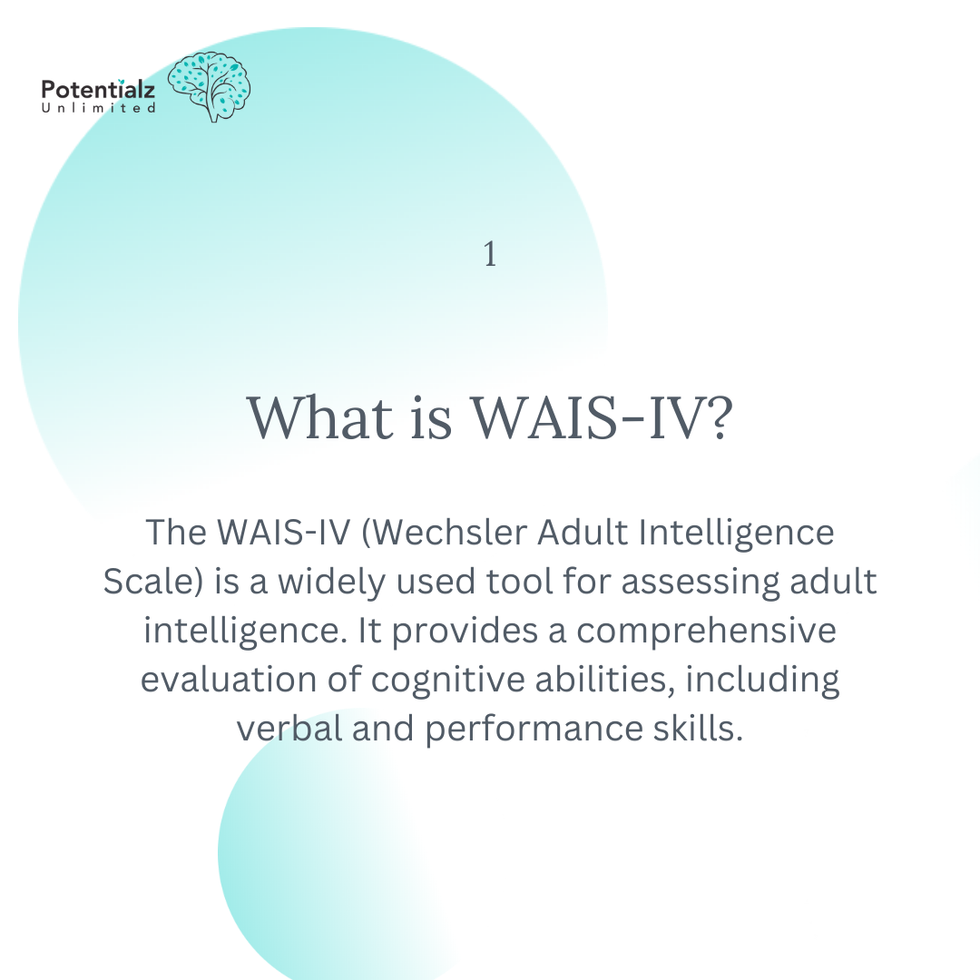Understanding IQ Tests: A Simple Guide
- Gurprit Ganda

- Mar 25, 2025
- 6 min read

Have you ever wondered about IQ tests? Maybe you've heard people talk about them or seen them in movies. Let's explore what these tests are all about in a way that's easy to understand.
What is an IQ Test?
An IQ test is a special kind of test that tries to measure how smart someone is. But it's not about how much you know - it's more about how well your brain works. These tests look at things like:
How well you can solve puzzles
How quickly you can figure things out
How good you are at remembering things
How well you understand words and numbers
IQ stands for "Intelligence Quotient." It's a way to give a number to how smart someone might be compared to other people their age.
The History of IQ Tests
IQ tests have been around for over 100 years. A French psychologist named Alfred Binet created the first one in the early 1900s. He wanted to help find students who might need extra help in school. Since then, many different types of IQ tests have been made.
How IQ Tests Work
When you take an IQ test, you'll answer a bunch of questions. These questions might be about:
Patterns in pictures
Math problems
Word meanings
Remembering lists of numbers
Solving puzzles
The test usually takes about 1 to 2 hours to finish. After you're done, your answers are compared to how other people your age did on the same test. This is how they figure out your IQ score.
Understanding IQ Scores
IQ scores are set up so that the average score is 100. This means:
If you score 100, you're right in the middle - average intelligence
If you score above 100, you might be smarter than average
If you score below 100, you might be below average in intelligence
But remember, most people (about two-thirds) score between 85 and 115. Only a small number of people score very high or very low.
Here's a simple breakdown:
Below 70: This might mean someone has learning difficulties
70-85: Below average
85-115: Average (most people are in this range)
115-130: Above average
Above 130: Very high (only about 2% of people score this high)
Different Types of IQ Tests
There are several IQ tests out there. For your understanding of IQ tests diversity, here we list the most common ones are:
Wechsler Adult Intelligence Scale (WAIS): This is the most widely used IQ test for adults.
Wechsler Intelligence Scale for Children (WISC): A scale designed by Wechsler and team for children.
Stanford-Binet Intelligence Scales: This test can be used for both kids and adults.
Raven's Progressive Matrices: This test uses pictures and patterns instead of words.
What IQ Tests Measure
IQ tests try to measure different parts of intelligence:
Verbal Comprehension: How well you understand and use words.
Perceptual Reasoning: How well you can solve problems using pictures and patterns.
Working Memory: How well you can remember and use information for a short time.
Processing Speed: How quickly you can do simple tasks.
Are IQ Tests Always Accurate?
It's important to know that IQ tests aren't perfect. They don't measure everything about a person's intelligence. For example, they don't test things like creativity or emotional intelligence. Also, your score can be affected by things like:
How you're feeling on the day of the test
How much sleep you got
How comfortable you are with taking tests
So, while IQ tests can give us some information, they don't tell the whole story about how smart someone is.
Other Types of Intelligence
Scientists now think there are different kinds of intelligence, not just what IQ tests measure. Some of these are:
Emotional Intelligence: Understanding and managing emotions.
Social Intelligence: Being good at interacting with other people.
Creative Intelligence: Being able to come up with new and original ideas.
Practical Intelligence: Being good at solving everyday problems.
Gardner's Theory of Intelligences
Gardner went a step further and identified these eight dimensions of intelligence:
Logical-Mathematical Intelligence: These people are great with numbers and solving puzzles. They love figuring things out and are often good at math and science.
Linguistic Intelligence: These folks are good with words. They might enjoy writing stories, speaking in front of others, or learning new languages.
Spatial Intelligence: These people are good at imagining things in their head. They might be great at drawing, reading maps, or building things.
Bodily-Kinesthetic Intelligence: These people are good at moving their bodies. They might be great at sports, dancing, or making things with their hands.
Musical Intelligence: These people understand and love music. They might be good at singing, playing instruments, or making up new songs.
Interpersonal Intelligence: These folks are good at understanding others. They're often great friends and might be good leaders because they understand how people feel.
Intrapersonal Intelligence: These people understand themselves well. They know what they like and don't like, and they're good at setting goals for themselves.
Naturalistic Intelligence: These people love nature and are good at understanding plants and animals. They might enjoy hiking, gardening, or learning about the environment.
The identification of eight types of intelligence shows that "smart" can mean different things, and people can be intelligent in various ways. Some could be really good at one or two of these, and others a little bit good at lots of them. That's what makes everyone unique and special.
Famous People and IQ
You might have heard about famous people's IQs. For example, some people say Albert Einstein had a very high IQ. But it's important to know that many of these are just guesses. Most famous people never took official IQ tests.
Also, having a high IQ doesn't automatically mean someone will be successful. Many other things, like hard work, creativity, and people skills, are important for success too.
Genius IQ
A genius is someone who is super smart or really good at something. They might come up with new ideas that no one else has thought of before. Geniuses can be great at things like math, music, art, or solving problems.
Savants: A Special Kind of Genius
Sometimes, there are people who are super amazing at one specific thing, even if they might struggle with other parts of life. These people are called savants. For example, a savant might be able to do really hard math problems in their head but have trouble with everyday tasks. Many savants have autism, which is a condition that affects how their brain works.
Savants are pretty rare - maybe only one in a million people. They show us that the brain can do some really incredible things!
Taking IQ Tests
If you want to take an IQ test, it's best to do it with a trained professional, like a psychologist. They can give you a proper test and explain what your score means. Be careful of online IQ tests - many of these aren't accurate and are just for fun.
Why Do People Use IQ Tests?
IQ tests are used for different reasons:
In schools: To help identify students who might need extra help or who might benefit from advanced classes.
In psychology: To help understand a person's strengths and weaknesses.
In research: To study intelligence and how it relates to other things.
In some job applications: Some companies use IQ-like tests as part of their hiring process.
Improving Your Intelligence
While your IQ score might not change much, you can always work on improving your brain power. Here are some ways:
Read a lot: Reading helps improve your vocabulary and knowledge.
Learn new skills: Try learning a new language or how to play an instrument.
Solve puzzles: Doing puzzles and brain teasers can help keep your mind sharp.
Stay curious: Always ask questions and try to learn new things.
Exercise: Physical activity is good for your brain too!
Conclusion: Understanding IQ Tests
IQ tests are just one way to measure some parts of intelligence. They can be interesting and sometimes useful, but they don't tell the whole story about a person's abilities. Everyone has different strengths and talents, and many of these aren't measured by IQ tests.
Remember, being "smart" isn't just about having a high IQ score. It's about how you use your abilities, how hard you work, and how you treat others. Whether your IQ is high, low, or average, you can always learn, grow, and do great things in life.
So, the next time you hear about IQ tests, you'll know what they're all about - and also what they don't tell us. Keep learning, stay curious, and remember that there are many ways to be smart!










































The AQ test was developed by Simon Baron-Cohen and is one of the most well-known screenings for autistic traits. Taking it online is a quick way to see how you score.